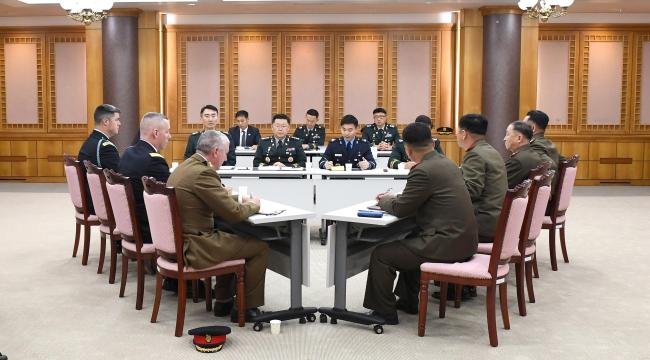Koreas, UNC discuss ways of allowing tourists to access JSA
By YonhapPublished : Nov. 13, 2018 - 21:11
Military officials from South and North Korea and the United Nations Command held another round of working-level consultations at the border truce village of Panmunjom Tuesday on disarming the Joint Security Area in the Demilitarized Zone and allowing civilians to travel freely inside the restricted area.
According to a government source, the three sides conducted a joint on-site inspection to further discuss the operation of surveillance equipment at the JSA along the inter-Korean border, as well as issues of tourist access to the JSA.
The Koreas agreed to disarm the JSA under the military agreement their countries' defense chiefs signed during the third summit between President Moon Jae-in and North Korean leader Kim Jong-un in Pyongyang in September. The UNC oversees activities inside the DMZ.

The source said the two Koreas and the UNC reportedly discussed ways of allowing civilian tours of the JSA under the guidance of DMZ police officers. If tourists from the South want to cross into the northern side of the JSA, they must follow the guidance of the South Korean DMZ police, and vice versa for those from the North.
If finalized, such a rule could serve to prevent incidents in the area such as defections, the source said.
"Free travel in the JSA mentioned in the inter-Korean military agreement doesn't mean that people can roam the area individually," the source said.
At the JSA, unarmed soldiers from the two Koreas serve as DMZ police and wear yellow armbands printed with "Panmunjom DMZ Police" in Korean.
Meanwhile, the three sides are closing in on establishing working codes for joint security in the area, as well as ways of sharing surveillance equipment information, Seoul's Ministry of National Defense said.
The three sides discussed technical issues in regards to sharing surveillance information," the ministry said.
Each side will adjust and relocate its surveillance equipment in the near future and will take measures on blind-spot monitoring.(Yonhap)







![[Graphic News] More Koreans say they plan long-distance trips this year](http://res.heraldm.com/phpwas/restmb_idxmake.php?idx=644&simg=/content/image/2024/04/17/20240417050828_0.gif&u=)
![[KH Explains] Hyundai's full hybrid edge to pay off amid slow transition to pure EVs](http://res.heraldm.com/phpwas/restmb_idxmake.php?idx=644&simg=/content/image/2024/04/18/20240418050645_0.jpg&u=20240419100350)






![[From the Scene] Monks, Buddhists hail return of remains of Buddhas](http://res.heraldm.com/phpwas/restmb_idxmake.php?idx=652&simg=/content/image/2024/04/19/20240419050617_0.jpg&u=20240419175937)

![[KH Explains] Hyundai's full hybrid edge to pay off amid slow transition to pure EVs](http://res.heraldm.com/phpwas/restmb_idxmake.php?idx=652&simg=/content/image/2024/04/18/20240418050645_0.jpg&u=20240419100350)

![[Today’s K-pop] Illit drops debut single remix](http://res.heraldm.com/phpwas/restmb_idxmake.php?idx=642&simg=/content/image/2024/04/19/20240419050612_0.jpg&u=)